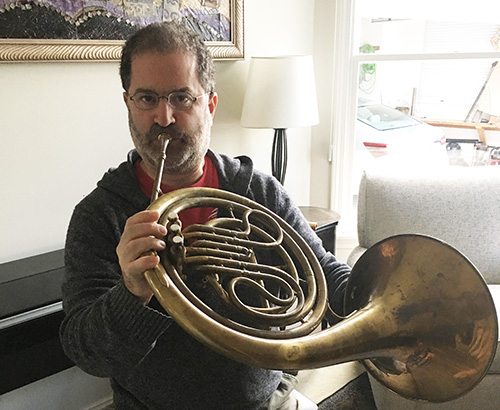Like the rest of the world, faculty at the University of Wisconsin-Madison Mead Witter School of Music are adjusting to new routines during the COVID-19 pandemic. Associate Professor of Horn Daniel Grabois talks about a few of the techniques he’s using to stay connected with students during this challenging time.

- Tell us more about the drill book you wrote. How did that come about?
As soon as we heard about the shutdown (that very night) and knew we would all be teaching remotely, it became very important to me to make sure my students were hitting all the basics every day in their practicing. Being a smart practicer is hard for ALL of us, no matter the level of education, and it is easy to lose motivation when we are apart from our colleagues.
For about four days, I played the whole routine through twice a day (it’s a one-hour routine), refining the drills, fleshing out details, nixing some drills and adding others, and so on. When I was satisfied, I started setting the book into Finale.
It was a complicated process. I set each drill into its own Finale file, and then I placed the Finale files into an Apple Pages document to lay out the book (I usually use Word for my documents, but Pages is much more friendly when it comes to mixing words and images). In the end, for every drill, I had to create a PDF in Finale, then open the PDF in Acrobat and crop it, then pop it into the Pages document and resize it. Any change I made in the drill after that involved resetting in Finale and going through the whole process again. The text surrounding the drills went through around 10 drafts (thanks to my wife, my brother, and my mom!).
On the eleventh day, I got it off to my publisher with a request that we make it cheap so as not to take advantage of the pandemic in order to make a buck. He agreed to publish it as a download for $10, and released it the next morning, day 12. I beat my goal by two days! We sold 16 copies on the first day, which was a single title record for the publishing company.
- What sort of new opportunities are you finding to be possible online?
Online is HARD for teaching. Because of insufficient bandwidth, it is really hard to hear students. Yes, you can hear them, but you can’t hear their actual sound, and you can’t hear details. In this online world of ours, we music faculty are recognizing that being in the room with a student beats every option.
That said, this has opened up new opportunities. For instance, I invited my old horn professor, who is now 88 years old, to talk to my students in studio class and to talk to the brass chamber groups I’m coaching.
I had a friend of mine who is an incredible electro-acoustic violinist talk to my electro-acoustic improv group, and another friend from that world will be doing the same thing in the future. Musician colleagues are willing to do this for each other because it is just a wonderful group of people who perform music for a living.
- Any additional advice for students during this time?
We all have more time than we normally do during the semester. That means we can practice more carefully, but we can also listen to more music, get in shape, eat right, and sleep enough. Let’s find the silver lining wherever we can.

